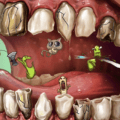When You Can’t Fall Asleep: The Surprising Reasons Why

Everyone has trouble sleeping sometimes. But if you find yourself lying awake night after night, it’s time to figure out why. There are many possible reasons why you can’t fall asleep, and some of them may surprise you.
**1. ** Stress and anxiety. These are two of the most common reasons why people have trouble sleeping. When you’re stressed or anxious, your body releases hormones that make it difficult to relax. This can make it hard to fall asleep and stay asleep.
**2. ** Depression. Depression can also interfere with sleep. People with depression often have trouble falling asleep and staying asleep, and they may wake up feeling tired.
**3. ** Medical conditions. Some medical conditions can cause sleep problems. These include sleep apnea, restless legs syndrome, and chronic pain.
**4. ** Medications. Some medications can also interfere with sleep. These include decongestants, cold medications, and some antidepressants.
**5. ** Bad sleep habits. If you have bad sleep habits, it can make it difficult to fall asleep and stay asleep. These habits include going to bed too late, napping during the day, and using electronic devices in bed.
6. Your environment. If your environment is not conducive to sleep, it can make it difficult to fall asleep and stay asleep. This includes things like noise, light, and temperature.
What Can You Do?
If you’re having trouble sleeping, there are a few things you can do to improve your sleep.
1. Identify the cause. The first step is to figure out what’s causing your sleep problems. Once you know the cause, you can start to address it.
2. Make changes to your lifestyle. This includes things like going to bed and waking up at the same time each day, avoiding caffeine and alcohol before bed, and creating a relaxing bedtime routine.
3. See a doctor. If you’ve tried to make changes to your lifestyle and you’re still having trouble sleeping, see a doctor. There may be an underlying medical condition that’s causing your sleep problems.
**4. ** Get help from a therapist. If stress or anxiety is causing your sleep problems, a therapist can help you learn how to manage your stress and anxiety.
5. Use medication. In some cases, medication may be necessary to help you sleep. However, medication should only be used as a last resort.
Getting a good night’s sleep is essential for your health and well-being. If you’re having trouble sleeping, don’t ignore it. There are things you can do to improve your sleep.
The Surprising Reasons Why You Can’t Fall Asleep
In addition to the common reasons listed above, there are a few other surprising reasons why you might not be able to fall asleep. These include:
- Blue light: The light emitted from electronic devices like smartphones, tablets, and computers can interfere with sleep. This is because blue light suppresses the production of melatonin, a hormone that helps regulate sleep.
- Noise: Even if you live in a quiet neighborhood, there are still plenty of noises that can disrupt your sleep. These noises can come from traffic, barking dogs, or even your own snoring.
- Temperature: Your body temperature naturally drops as you fall asleep. If your bedroom is too hot or too cold, it can be difficult to fall asleep.
- Light: Even if you have blackout curtains, there may still be some light coming into your bedroom. This light can interfere with your sleep, even if you’re not aware of it.
What You Can Do to Get a Good Night’s Sleep
If you’re having trouble sleeping, there are a few things you can do to improve your chances of getting a good night’s rest. These include:
- Create a relaxing bedtime routine. This might include taking a warm bath, reading a book, or listening to calming music.
- Make sure your bedroom is dark, quiet, and cool. This will help to create an environment that’s conducive to sleep.
- Avoid caffeine and alcohol before bed. These substances can interfere with sleep.
- Get regular exercise. Exercise can help you sleep better at night. However, avoid exercising too close to bedtime, as this can make it difficult to fall asleep.
- See a doctor. If you’ve tried all of the above and you’re still having trouble sleeping, see a doctor to rule out any underlying medical conditions.
Conclusion
There are many reasons why you might have trouble falling asleep. Some of them are more common than others, but it’s important to figure out what’s causing your sleep problems so you can address them. If you’ve tried to make changes to your lifestyle and you’re still having trouble sleeping, see a doctor. There may be an underlying medical condition that’s causing your sleep problems.






